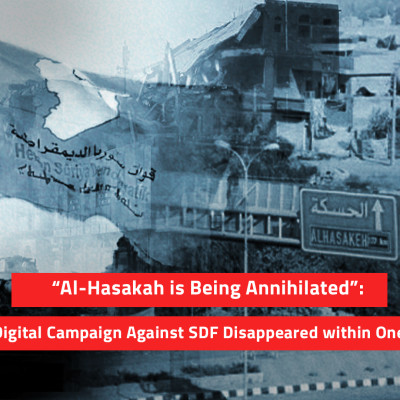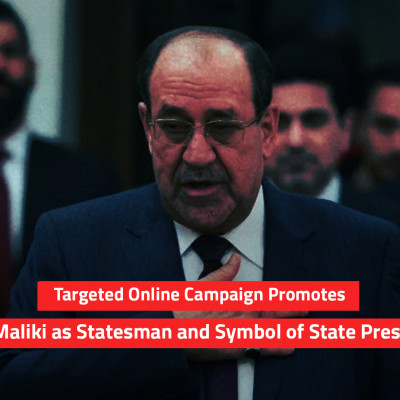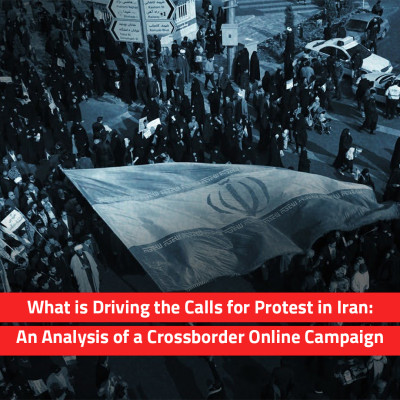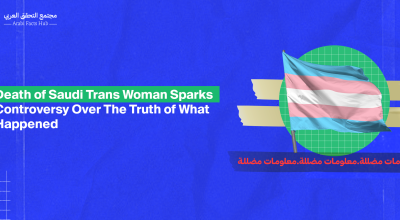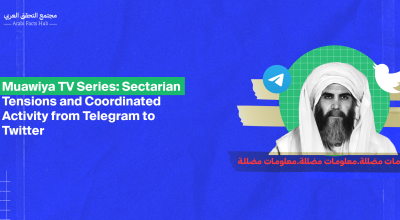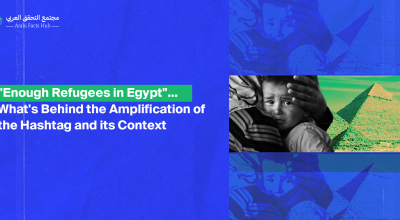Coordinated Gulf and Egyptian Campaigns Gloat over the Murder of Haniyeh
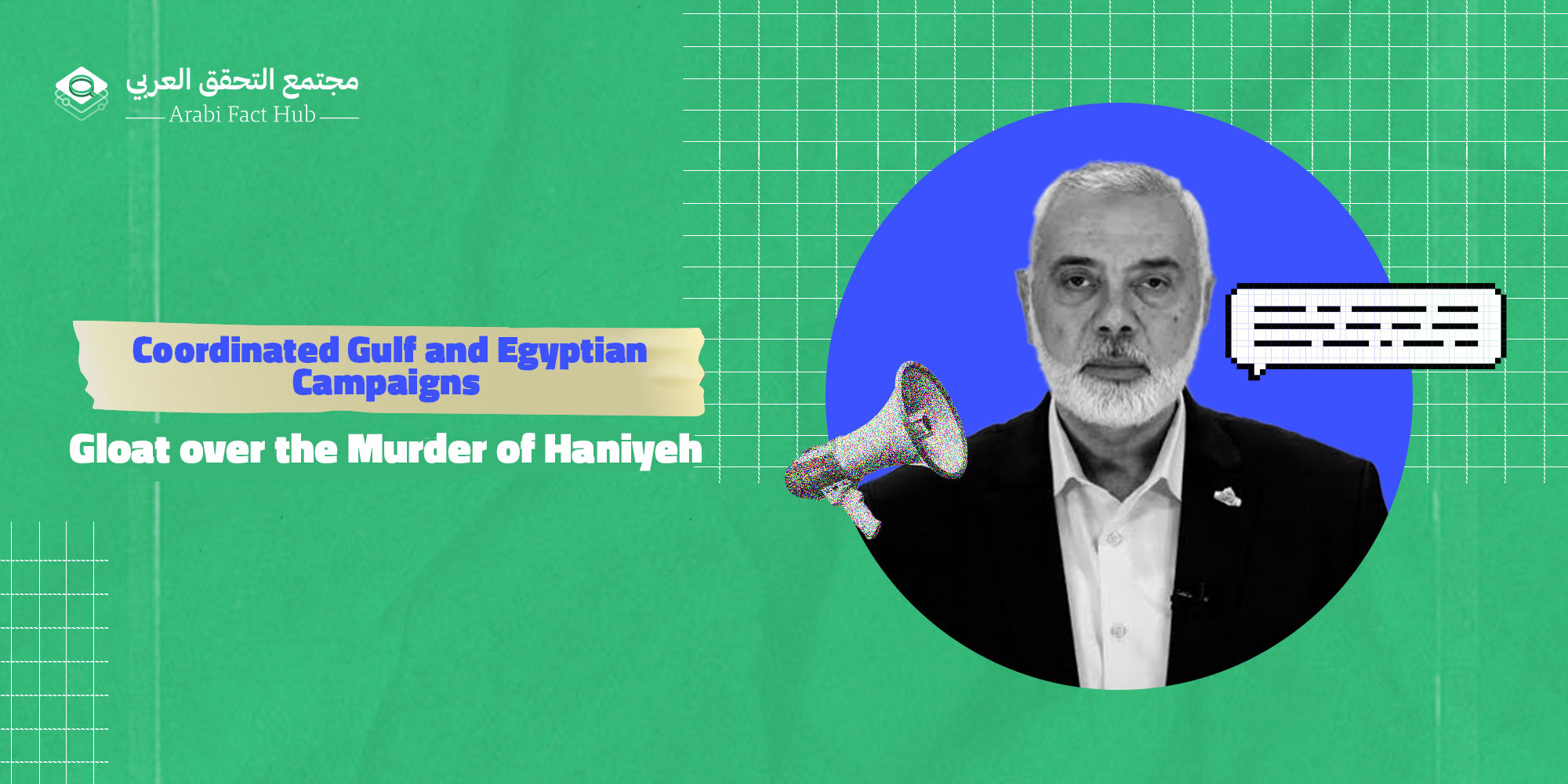
As soon as the murder of Haniyeh in Tehran was reported, coordinated Gulf and Egyptian campaigns were launched to gloat over his killing and promote misinformation about Hamas.
Early on the morning of Wednesday, July 31, 2024, Ismail Haniyeh and his personal guard were killed in the Iranian capital, Tehran. Accounts of the incident varied, with some reporting an airstrike targeting his residence, while The New York Times, claimed that an explosive device had been placed in his room in a large complex in northeast Tehran nearly two months earlier.
The assassination occurred shortly after Haniyeh attended the inauguration ceremony of the new Iranian president, Masoud Pezeshkian, and met with Iranian Supreme Leader Ali Khamenei.
As soon as Haniyeh's death was announced, the Arabic-language hashtag #Ismail_Haniyeh garnered over a million posts, published by more than 293,000 accounts on X, and was viewed approximately 262 million times, according to statistics from Meltwater. Haniyeh's name also appeared in 1.614 million posts written in English, published by 534,000 accounts, and viewed 421 million times.
Period of Activity of #Ismail_Haniyeh – Meltwater
Gulfi Manipulation
In the middle of discussions about Haniyeh's assassination, Gulf accounts manipulated X policies by artificially amplifying hashtags mocking the death of the Hamas leader. Interaction with these hashtags surged in a short period of time across several Gulf countries, with Saudi Arabia and the United Arab Emirates leading the charge.
The Iranian Revolutionary Guard announced Ismail Haniyeh's death four hours after the assassination, which took place around 2 a.m. Tehran time on Wednesday. Two hours later, the hashtag #Hotel_Martyr appeared, containing approximately 28,000 posts that were viewed 8.666 million times. These posts generated 75,161 interactions (likes, shares, comments, and quoted replies) between July 31 and August 2, according to Meltwater. The hashtag saw a near-vertical spike on August 1, 2024, driven by 15,868 posts on that day alone, a record-breaking rate reflecting abnormal activity on the hashtag.
The first tweet using the hashtag was posted at 7:09 a.m. Riyadh time by the account @sfh1444, which contained the hashtag accompanied by laughing emojis in response to a post by Al Jazeera about the incident. In subsequent tweets, the account expressed happiness over Haniyeh's death, mockingly writing that the assassination turned him into "Iranian kebab," and ridiculed a mourning post by Haniyeh's daughter.
The account has no followers and does not indicate where it is based, but its interactions suggest involvement in defending the Saudi regime's interests and a consistent pattern of attacking Hamas. The account also engaged with other Saudi tweets that celebrated Haniyeh's death.
The first posts using the hashtag were mainly from accounts displaying Saudi symbols and hashtags, with profile pictures of King Salman bin Abdulaziz and Crown Prince Mohammed bin Salman. Some of these accounts described themselves as "social influencers," such as Rajeh Al Shahri and Al Rad' Al Saudi (Saudi Deterrence). Our analysis indicates that 30 of the accounts involved in the campaign mocking Haniyeh's death had previously launched orchestrated campaigns against critics of Saudi Arabia.
Negative discourse reflecting the celebration of Haniyeh's death dominated 53.2% of the posts using the hashtag. These posts included insults and accusations against Haniyeh and Hamas, with a focus on the claim that Haniyeh was loyal to Iran while opposing the Saudi regime.
Examples of some of the posts published with the hashtag include:
- "Ismail Haniyeh sacrificed the people of Gaza, offering them as a sacrifice to Israel, in order to please Iran. And now, Iran sacrifices him on the day of the Iranian president's inauguration to please Israel."
- "After living his life as a loyal agent to the enemies of the faith, and after his role as an agent ended and his value diminished, #Ismail_Haniyeh was eliminated in the very hotels where he managed many acts of treachery and betrayal."
- "He trades in the blood of the weak, sacrificing Palestinian lives for the sake of Iran! They dare to speak against Saudi Arabia and curse its rulers, but God turned his treachery back on him, right in the heart of his allies’ and loved ones' domain (and your Lord is never forgetful). To Hell, and what an evil destination."
-
-
-
-
A word cloud of the negative terms most frequently used on the hashtag – Meltwater
Meltwater showed that 5,500 posts using the hashtag were published from Saudi Arabia, making it the top country in terms of the number of posts on the hashtag. 19.8 thousand posts came from accounts with unknown locations, which is an indicator of non-organic activity. Retweets constituted 65.5% of the total posts on the hashtag at 18.6 thousand posts, while replies accounted for 23.4% (6.6 thousand posts) compared to 2,300 original posts (2.3%). These statistics are another indicator that activity on the hashtag was coordinated and artificially amplified.
Egypt chimes in
While Egypt officially condemned the killing of Ismail Haniyeh, unverified accusations against Hamas for its alleged involvement in the killing of Egyptian soldiers spread widely. The dissemination of these accusations was not spontaneous; it was driven by an organized campaign involving public figures and accounts known for their pro-government propaganda. These posts focused on spreading claims that Hamas was involved in the killing of 16 Egyptian soldiers in 2012 and was responsible for the death of the renowned Egyptian officer Ahmed El Mansi. In contrast to these widespread claims, Egyptian authorities did not accuse Hamas at the time of these deaths, and no group claimed responsibility for the killing of the Egyptian soldiers. As for El Masi, the "Islamic State – Sinai Province" claimed responsibility for the "Barth attack" which resulted in his killing.
We also observed the circulation of more disinformation, including statements attributed to Ismail Haniyeh, claimed to have been made in conjunction with the June 30, 2013 demonstrations and the pro-Morsi sit-in at Rabaa Al Adawiya Square, like that Haniyeh threatened to invade Egypt at that time. These untrue claims have been circulating since 2014.
These accusations and claims were widely amplified and promoted with the support of accounts and groups that regularly organize campaigns supporting the Egyptian regime and attacking its critics.
The accusations were also posted by public figures, including media personality Ahmed Moussa and former football player Ahmed Hossam Mido.
Journalist Sahar El Ga’arra published a fake cover of Forbes magazine, claiming that Haniyeh owned four billion dollars. This image was released by the Israeli Ministry of Foreign Affairs in November 2023 as part of its counter-propaganda campaign against Hamas and its leaders.
In the same vein, an account with the name Bakhit El Masry, known as "The Maestro," chimed in. The Maestro is a prominent figure in trolling and propaganda campaigns for the government. El Masry posted tweets mocking the Iranian reaction to Haniyeh's death.
Propaganda Groups on Facebook
In the Egyptian virtual sphere, the spread of misleading information about Ismail Haniyeh extended to other social networks. On Facebook, pro-government groups played a significant role in disseminating misinformation about Hamas's alleged involvement in the killing of the 16 soldiers. Over 160 posts promoting this claim were circulated, most of which came from pro-government groups, resulting in more than 21,000 interactions, according to CrowdTangle, a tool specialized in analyzing Facebook posts.
Some of the groups have names that clearly indicate their affiliation with the Egyptian regime, such as: "Egypt Will Not Bow," "The Men of the Egyptian Army," "Egyptian Hero Commandos," "Battalion 16 - Media," "Honest Egyptians," and "Egyptian Alliance for Social Media." All of these are propaganda groups focused on promoting populist rhetoric, who launch and participate in electronic campaigns supportive of the Egyptian regime. Some of those managing these groups have been invited to official events that were attended by the Egyptian president Abdel Fattah El Sisi, such as the annual Iftar. Arabi Facts Hub previously analyzed online campaigns that featured these groups.

 Period of Activity of #Hotel_Martyr – Meltwater
Period of Activity of #Hotel_Martyr – Meltwater



























